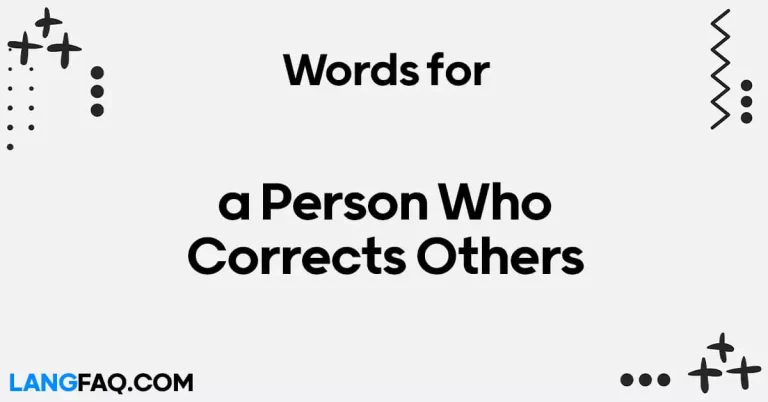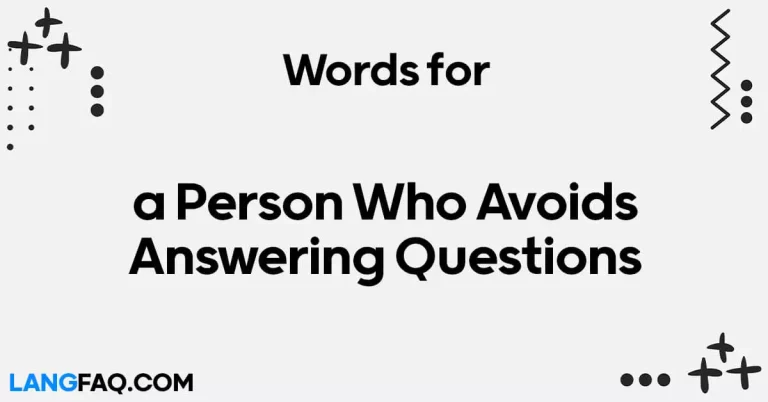Are you tired of dealing with people who consistently fail to uphold their promises? Do you ever find yourself searching for the perfect word to describe someone who doesn’t keep their word?
Look no further! In this article, we’ll unravel the linguistic intricacies of addressing this all-too-common behavior. So, what do you call someone who doesn’t keep their word?
The answer may surprise you, but it’s just the tip of the iceberg. Join us as we delve into a world of synonyms, word definitions, and insightful tips to enhance your vocabulary and command of the English language.
Key Points We’ll Explore:
- Unveiling the Perfect Term
- The Power of Synonyms
- Defining the Behavior
- Exploring the Impact
- Strategies for Dealing with Such Individuals
- The Importance of Trustworthiness
- Elevating Your Vocabulary
Let’s embark on this enlightening journey to expand your lexicon and sharpen your linguistic prowess.
7 Powerful Words for Someone Who Doesn’t Keep Their Word
You’ve probably heard the term “promise-breaker,” but there are far more expressive words to describe someone who doesn’t keep their word.
Some of these terms carry a stronger punch and can be more evocative when you want to emphasize the severity of the situation. Here are a few options to consider:
- 1. Deceiver: A person who misleads or tricks others with false promises.
- 2. Reneger: Someone who habitually reneges on their commitments.
- 3. Perfidious: An adjective describing someone who is intentionally deceitful and untrustworthy.
- 4. Faithless: Someone who has betrayed the trust of others by not keeping their word.
- 5. Unreliable: A straightforward term for someone who cannot be counted on to fulfill their promises.
- 6. Dishonest: Someone who lacks integrity and is not truthful in their dealings.
- 7. Inconstant: Describes a person whose promises are inconsistent and frequently broken.
Remember, the choice of word can convey different nuances, so pick the one that best suits the context and degree of disappointment.
1. Deceiver
Definition: A deceiver is someone who misleads or tricks others with false promises, often with the intent to manipulate or gain an advantage.
Usage and Examples:
- He claimed he would pay back the money, but he turned out to be a deceiver, disappearing without a trace.
- The con artist successfully deceived many people by promising them incredible returns on their investments.
Grammar/Usage Rules:
- Use “deceiver” as a noun to refer to the person who engages in deceptive practices.
- You can also use “deceive” as a verb, as in “He tried to deceive me with his fake sincerity.”
Tips:
- Be cautious when dealing with deceivers, as they are often skilled manipulators.
- Verify promises and claims made by others to avoid falling victim to deceit.
2. Reneger
Definition: A reneger is someone who habitually reneges on their commitments, failing to follow through on promises or agreements.
Usage and Examples:
- She’s known as a reneger because she frequently cancels plans at the last minute.
- The reneger promised to finish the project on time but failed to deliver once again.
Grammar/Usage Rules:
- “Reneger” is primarily used as a noun to describe someone who consistently breaks promises or commitments.
Tips:
- If you frequently deal with a reneger, consider setting clear expectations and consequences for unfulfilled promises.
3. Perfidious
Definition: “Perfidious” is an adjective that describes someone who is intentionally deceitful and untrustworthy, often betraying the trust of others.
Usage and Examples:
- His perfidious actions left his friends feeling betrayed and hurt.
- The perfidious behavior of the double agent jeopardized the entire mission.
Grammar/Usage Rules:
- “Perfidious” is used to describe the character or actions of an individual.
- It is less commonly used in everyday conversation compared to simpler terms like “untrustworthy.”
Tips:
- “Perfidious” adds a level of sophistication to your vocabulary and is particularly useful in written communication.
4. Faithless
Definition: “Faithless” is an adjective used to describe someone who has betrayed the trust of others by not keeping their word or commitments.
Usage and Examples:
- Her faithless partner left her heartbroken when he broke his promises.
- The faithless employee was fired for repeatedly failing to meet deadlines.
Grammar/Usage Rules:
- “Faithless” is often used to describe individuals who are disloyal or unreliable in their commitments.
Tips:
- Use “faithless” to emphasize the breach of trust and loyalty when someone doesn’t keep their word.
5. Unreliable
Definition: “Unreliable” is a straightforward term used to describe someone who cannot be counted on to fulfill their promises or commitments.
Usage and Examples:
- He’s become so unreliable lately, always making excuses for not keeping his word.
- An unreliable narrator in the story cast doubt on the truth of the events.
Grammar/Usage Rules:
- “Unreliable” can be used both as an adjective to describe individuals and as a general term for things that cannot be trusted.
Tips:
- Reserve “unreliable” for situations where the consistency and trustworthiness of someone’s commitments are in question.
6. Dishonest
Definition: “Dishonest” is an adjective describing someone who lacks integrity and is not truthful in their dealings, including promises and commitments.
Usage and Examples:
- His dishonest behavior, including breaking promises, eventually caught up with him.
- Dishonesty in business transactions can lead to legal consequences.
Grammar/Usage Rules:
- “Dishonest” can be applied broadly to describe individuals who engage in deceitful or fraudulent activities.
Tips:
- When someone’s lack of truthfulness extends to their promises, “dishonest” is an appropriate term to use.
7. Inconstant
Definition: “Inconstant” describes a person whose promises or commitments are inconsistent and frequently broken due to a lack of reliability.
Usage and Examples:
- His inconstant behavior in relationships made it difficult for anyone to trust him.
- The inconstant weather kept changing from sunny to rainy throughout the day.
Grammar/Usage Rules:
- “Inconstant” is less common in everyday conversation and is often used in more formal or literary contexts.
Tips:
- Use “inconstant” to emphasize the fluctuating nature of someone’s commitments or behavior.
Incorporating these alternative word phrases into your vocabulary will not only make your communication more precise but also enhance your ability to express the nuances of someone’s behavior when they don’t keep their word. Remember to choose the word that best fits the context and level of severity, and don’t hesitate to explore synonyms further to enrich your linguistic repertoire.
7 Synonyms for Someone Who Doesn’t Keep Their Word
Synonyms are a word enthusiast’s playground. They allow you to add depth and precision to your vocabulary. In this section, we’ll explore a plethora of synonyms for the phrase “someone who doesn’t keep their word.” Each synonym carries its own unique flavor, allowing you to communicate your thoughts with finesse.
- Betrayal: A strong term highlighting the breach of trust.
- Fickle Friend: Emphasizing the unpredictability of the person.
- Covenant Breaker: Evoking a sense of commitment gone awry.
- False Promiser: Directly addressing the issue of unfulfilled promises.
- Oathbreaker: Underlining the violation of a solemn promise.
- Untruthful Companion: Focusing on the lack of honesty in the relationship.
- Perjury Prodigy: Indicating a person skilled in falsehoods.
By incorporating these synonyms into your vocabulary, you can better articulate your feelings and thoughts when dealing with someone who consistently fails to keep their word.
Covenant Breaker
Definition: A covenant breaker is someone who breaks solemn promises or agreements, often with serious consequences or implications.
Insights:
- “Covenant breaker” carries a weighty and formal tone.
- It implies the violation of a significant, binding commitment.
Example:
Imagine a business partner who breaches a legally binding contract. In this case, you could refer to them as a “covenant breaker” to emphasize the gravity of their actions.
Usage Tip:
- Reserve “covenant breaker” for situations involving legally binding agreements or commitments of great significance.
False Promiser
Definition: A false promiser is someone who habitually makes promises but fails to fulfill them, often resulting in disappointment or frustration.
Insights:
- “False promiser” focuses on the act of making empty promises.
- It implies a recurrent pattern of raising expectations and letting others down.
Example:
Consider a friend who repeatedly promises to help you with a project but never follows through. You might describe them as a “false promiser” to highlight their consistent failure to deliver.
Usage Tip:
- Use “false promiser” when you want to emphasize the repetitive nature of someone’s unfulfilled promises.
Oathbreaker
Definition: An oathbreaker is someone who violates solemn oaths or pledges, often causing harm or betrayal of trust.
Insights:
- “Oathbreaker” carries a sense of gravity and solemnity.
- It’s often associated with breaking promises or commitments of great significance.
Example:
Imagine a situation where a political leader fails to uphold their campaign promises. In such cases, you might refer to them as an “oathbreaker” to underscore the betrayal of public trust.
Usage Tip:
- Use “oathbreaker” when discussing serious commitments or promises, especially those that involve moral or ethical implications.
Untruthful Companion
Definition: An untruthful companion is someone who lacks honesty and truthfulness in their interactions, including commitments and promises.
Insights:
- “Untruthful companion” suggests a broader context of interpersonal relationships.
- It emphasizes the general lack of honesty in one’s character.
Example:
Imagine a colleague who consistently exaggerates their accomplishments and makes empty promises. You could describe them as an “untruthful companion” to address their overall lack of honesty.
Usage Tip:
- Use “untruthful companion” when you want to highlight a person’s dishonesty in various aspects of their interactions.
Perjury Prodigy
Definition: A perjury prodigy is someone exceptionally skilled in falsehoods and deceit, often using lies to manipulate or deceive others.
Insights:
- “Perjury prodigy” is a more whimsical and metaphorical phrase.
- It implies a high degree of proficiency in deceitful practices.
Example:
Picture a character in a novel who can effortlessly manipulate others with lies and false promises. You might describe them as a “perjury prodigy” to capture their exceptional talent for deceit.
Usage Tip:
- Use “perjury prodigy” in creative or literary contexts to add a touch of metaphorical flair to your descriptions.
Defining the Behavior:
Understanding the psychology behind someone who doesn’t keep their word is crucial for effective communication and problem-solving. This behavior can be rooted in various causes, such as forgetfulness, lack of commitment, or even deliberate deception. It’s essential to discern the underlying reasons to address the issue effectively.
Exploring the Impact:
The consequences of dealing with someone who doesn’t keep their word can be far-reaching. It can strain relationships, erode trust, and lead to frustration and disappointment. Recognizing these impacts is the first step toward finding constructive solutions.
Strategies for Dealing with Such Individuals:
Navigating relationships with individuals who habitually break promises can be challenging. However, there are strategies you can employ to address this behavior and maintain healthier connections. We’ll delve into practical tips for effectively dealing with promise-breakers.
The Importance of Trustworthiness:
Trust is the cornerstone of any successful relationship, whether personal or professional. We’ll discuss the vital role trustworthiness plays in maintaining strong bonds and why it’s essential to address issues related to unfulfilled promises promptly.
Elevating Your Vocabulary:
Expanding your vocabulary is not just about finding the right words to describe others but also about expressing yourself more eloquently. In this section, we’ll explore how enriching your vocabulary can enhance your communication skills and boost your confidence.
Conclusion: Expanding Your Lexicon
In our exploration of alternative word phrases for someone who doesn’t keep their word, we’ve uncovered a rich array of terms, each with its unique nuances and applications. The power of language lies not only in communication but also in conveying the subtleties of human behavior and relationships.
As you continue to enrich your vocabulary, remember that choosing the right word is an art that can elevate your communication to new heights. Whether you opt for the gravitas of “covenant breaker” or the metaphorical charm of “perjury prodigy,” your words have the ability to capture the essence of the situation and convey your message effectively.
So, whether you’re engaged in everyday conversations, crafting written works, or seeking to enhance your overall language proficiency, these alternative word phrases provide you with a diverse palette to paint a vivid picture of those who fall short of their commitments.
Expand your lexicon, choose your words wisely, and let your language reflect the depth of your understanding and expression. In doing so, you’ll not only enhance your command of the English language but also enrich your ability to communicate and connect with others on a more profound level.
What are some strategies for confronting a friend who frequently breaks promises?
Approach your friend with empathy and honesty, express your feelings, and seek open communication to understand their perspective.
Is it ever okay to forgive someone who repeatedly doesn’t keep their word?
Forgiveness can be a healing choice, but it’s essential to set boundaries and ensure that trust is rebuilt through actions, not just words.
How can I avoid being seen as someone who doesn’t keep their word?
Prioritize transparency, communicate clearly, and only make commitments you can genuinely fulfill. Follow through on your promises consistently.
Are there cultural differences in how people perceive promise-keeping?
Yes, cultural norms can influence expectations regarding promises. It’s important to be aware of and respect cultural variations in commitment and trust.
What role does accountability play in maintaining trust when promises are broken?
Accountability is crucial. Acknowledge the breach, take responsibility, and work towards making amends to rebuild trust and maintain healthy relationships.







